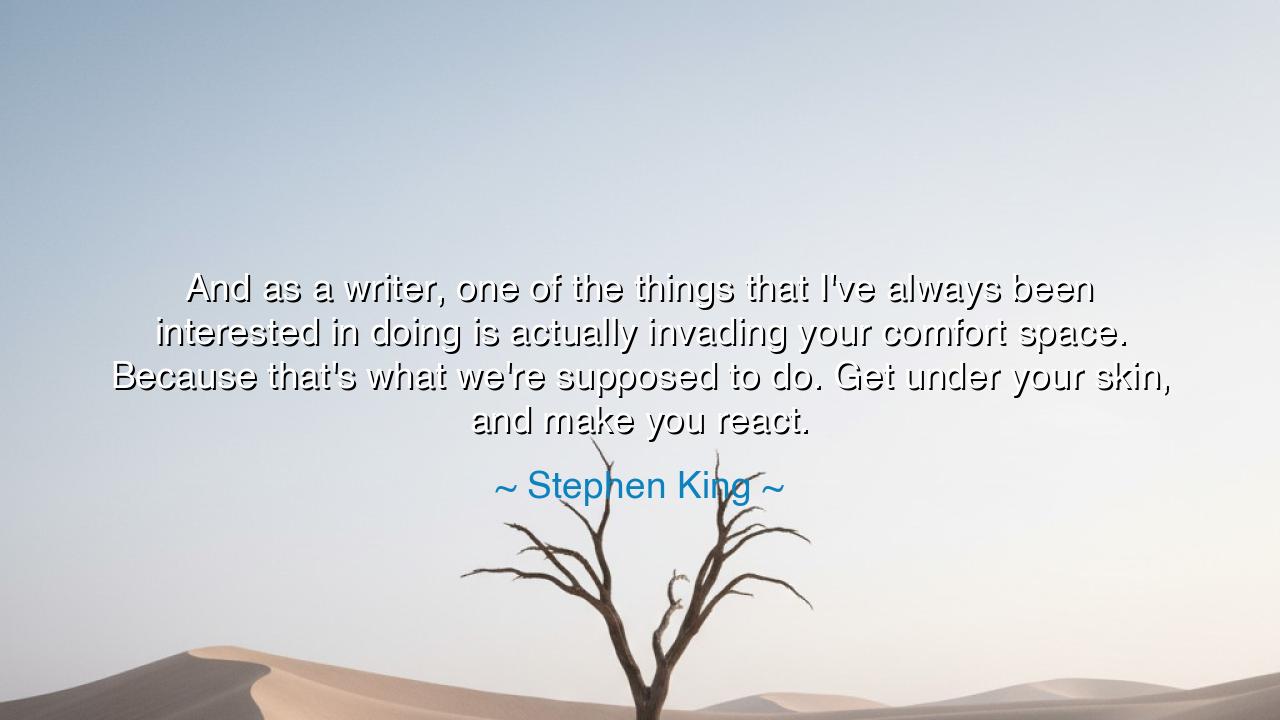
And as a writer, one of the things that I've always been
And as a writer, one of the things that I've always been interested in doing is actually invading your comfort space. Because that's what we're supposed to do. Get under your skin, and make you react.






In the realms of creation and expression, the artist, whether through words, brushstrokes, or music, is called not merely to please, but to disturb—to challenge, to provoke, to awaken something deep within the soul. Stephen King, one of the greatest masters of literature, once remarked, “And as a writer, one of the things that I've always been interested in doing is actually invading your comfort space. Because that's what we're supposed to do. Get under your skin, and make you react.” These words, though simple, carry a powerful truth: the role of the artist is not just to create beauty, but to stir the deepest emotions, to push the boundaries of what is known and safe, and to invite us into unfamiliar territories of our own minds.
The ancients understood this very well. Socrates, the philosopher, in his relentless pursuit of wisdom, would often engage in conversations that were designed not for comfort, but for discomfort—to rattle the assumptions and beliefs of those around him. Through his method of questioning, he would invade the comfort of others, forcing them to confront the inconsistencies in their thinking, and in doing so, he invited them to grow. His work was not about appeasing the minds of the masses, but about leading them to a higher truth, no matter how uncomfortable that path might be. Plato, too, followed in his footsteps, recording these uncomfortable exchanges, for it is through disruption that true knowledge often arises.
Similarly, the Greek tragedians, such as Sophocles and Euripides, created plays not simply to entertain, but to deeply move the hearts of their audience. The plays of Sophocles, particularly his masterpiece Oedipus Rex, were designed to unsettle. The tragedy was not just in the story, but in its power to reveal uncomfortable truths about the human condition—our inability to escape fate, our blindness to our own flaws, and the devastating consequences of hubris. To experience such a play was to be deeply disturbed, to be pulled from the safety of one’s daily life into a realm of reflection, discomfort, and awakening. The ancients knew that it was only through provocation—through disturbing the comfortable—that true transformation could occur.
King, in his own way, follows in this ancient tradition. Known for his mastery of the horror genre, his works—like Carrie, The Shining, and It—are not just tales of terror for the sake of fear, but explorations of the darkness within the human soul. Through his storytelling, King seeks to invade the reader’s comfort space, to make them confront their fears, their vulnerabilities, and the parts of themselves they would rather not acknowledge. Just as Sophocles and Socrates used discomfort to enlighten, King uses fear to illuminate the deeper recesses of the psyche. He does not just want us to read and forget; he wants us to feel, to react, to be moved by what we encounter in the pages.
The lesson of Stephen King and the ancients is clear: art is not merely for entertainment or comfort—it is meant to challenge us, to push us into uncomfortable spaces, to confront us with the realities we often seek to avoid. Creation—whether through writing, painting, or music—is about awakening us to a deeper truth, even if that truth is disturbing. In King’s words, we are reminded that great art is often the kind that forces us to react, that disturbs us from our complacency, and calls us to engage with the world in new and profound ways.
Consider the impact of modern literature or art on the soul of society. The beat poets of the 1950s, like Allen Ginsberg and Jack Kerouac, sought to invade the comfort space of the post-World War II generation, challenging their ideals and shaking their sense of conformity. Through works like Howl and On the Road, they demanded a new kind of engagement with life, urging people to question the systems around them and their place within it. Their art was an act of rebellion, but also one of awakening—just as King’s work calls us to confront the darker parts of our humanity, the beat poets forced society to reckon with its discontent.
As we reflect on King’s words, let us remember that in our own lives, we are also called to create and challenge. Whether as artists, leaders, or individuals, our role is not to create comfortable spaces, but to disrupt the stagnant waters of complacency, to spark change and growth in those around us. To truly live is to move beyond the comfort of the known and into the discomfort of the unknown, to question and explore the limits of our understanding, and to embrace the uncomfortable truths that await us. Just as King disturbs us with his words, so too must we disturb the complacency of the world with our actions, our ideas, and our creativity. Only then can we truly awaken to the life that lies beyond the comfort of the familiar.






AAdministratorAdministrator
Welcome, honored guests. Please leave a comment, we will respond soon